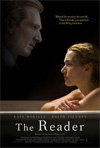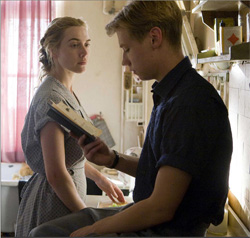The
Curious Case of Benjamin Button
Fantastic Mr. Fox
Gran Torino
Harry Potter and the Half Blood Prince
The Hurt Locker
The
Informant!
Julie and Julia
Milk
The Reader
Serious Man
Film Reviews from 2008
Film
Reviews from 2007
Film Reviews
from 2006
The Reader
Eight years pass. Michael is now a law student. His class visits a courtroom, where wo men are on trial for being concentration camp guards during the War. Michael is astonished to see Hannah standing as one of the accused women. Not only is she one of the group, she is accused of being the leader of guards which allowed a group of 500 Jewish women to die in a fire, rather than risk an escape. Could this really be true of the woman whom he had loved? The Reader is a fascinating film, with rich, complex, morally ambiguous characters. The story is told through Michael’s eyes, as he ages from a schoolboy to an adult. However, Hannah is the pivotal character. Hannah haunts Michael throughout his life. In most movies, the characters are immediately recognized as “good” or “heroic” on the one hand, or “evil” on the other. Hannah and Michael cannot be easily labeled. Michael is scarred by his relationship with Hannah. He cares for her, yet cannot bring himself to speak to her during the trial, and even withholds important information. It’s easy to dislike Hannah, who seems devoid of all emotion. Only briefly with Michael does she seem happy. Hannah shows no remorse for the terrible crimes for which she is accused. However, in the course of the film, we do find out information about Hannah which may temper our feelings toward her. Can one feel sympathy for a concentration camp guard? Or a woman who enters into a sexual relationship with a minor?
Kate Winslet has been winning awards for her portrayal of Hannah, and is now deservedly nominated for an Oscar. She gives a great performance. Hannah is a woman of few words. Winslet conveys her thoughts by her tight posture and deep eyes, staring forward at the trial, making contact with no one. Is she a cold-hearted mass murderer, or a victim, or both? David Kross as young Michael also deserves credit for his sensitive performance. The great actor Ralph Fiennes plays Michael as an adult. As good as the cast is, it’s Kate Winslet that I will remember. I know her performance as Hannah will haunt me for a long time. Tom Condon, OP
|
Best Actress:
Kate Winslet USCCB classifications: (United States Conference of Catholic Bishops) is not available for this film. |



 Early in the The Reader, set in Berlin
in 1958, 15 year old schoolboy Michael becomes ill on a streetcar,
gets off and wanders into an alley. Hannah, a woman in her 30s, going to her small flat from
her job as a streetcar conductor, stops briefly to care for him. When
he is well enough, Michael returns to thank Hannah, and they end up having
a brief, but torrid affair. (A note of caution: there is
nudity in these scenes.) Hannah frequently asks Michael to read
to her, which she enjoys very much. One day Michael goes
to the flat to find that Hannah has left. He is devastated, assuming
he will never see her again.
Early in the The Reader, set in Berlin
in 1958, 15 year old schoolboy Michael becomes ill on a streetcar,
gets off and wanders into an alley. Hannah, a woman in her 30s, going to her small flat from
her job as a streetcar conductor, stops briefly to care for him. When
he is well enough, Michael returns to thank Hannah, and they end up having
a brief, but torrid affair. (A note of caution: there is
nudity in these scenes.) Hannah frequently asks Michael to read
to her, which she enjoys very much. One day Michael goes
to the flat to find that Hannah has left. He is devastated, assuming
he will never see her again. These questions lingered as I left the theater. I admire the filmmakers
(director Stephen Daldry and screenwriter David Hare, adapting the novel
by Bernhard Schlink) for not telling me what to think of these characters. Michael
and Hannah are deeply wounded characters who have sinned and have been
sinned against. Yet there is still something about them that kept
me caring for them. As much as Michael wants to, he cannot stop
caring about Hannah. And neither could I. They are like people
I’ve met in my many years of ministry.
These questions lingered as I left the theater. I admire the filmmakers
(director Stephen Daldry and screenwriter David Hare, adapting the novel
by Bernhard Schlink) for not telling me what to think of these characters. Michael
and Hannah are deeply wounded characters who have sinned and have been
sinned against. Yet there is still something about them that kept
me caring for them. As much as Michael wants to, he cannot stop
caring about Hannah. And neither could I. They are like people
I’ve met in my many years of ministry.